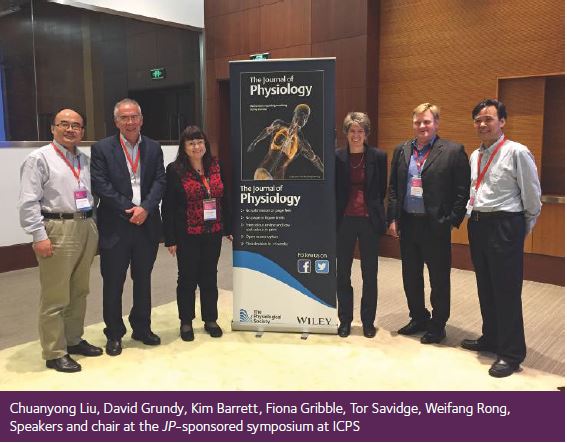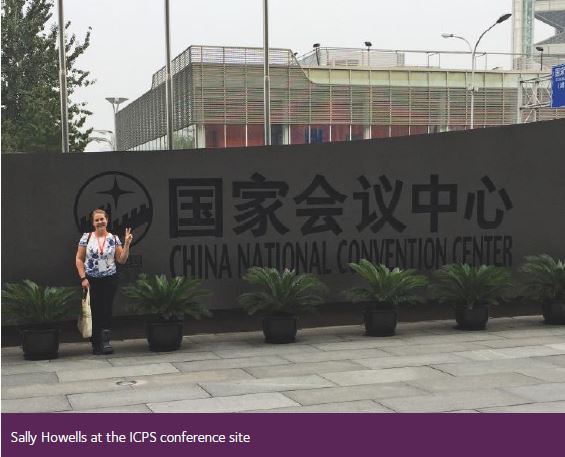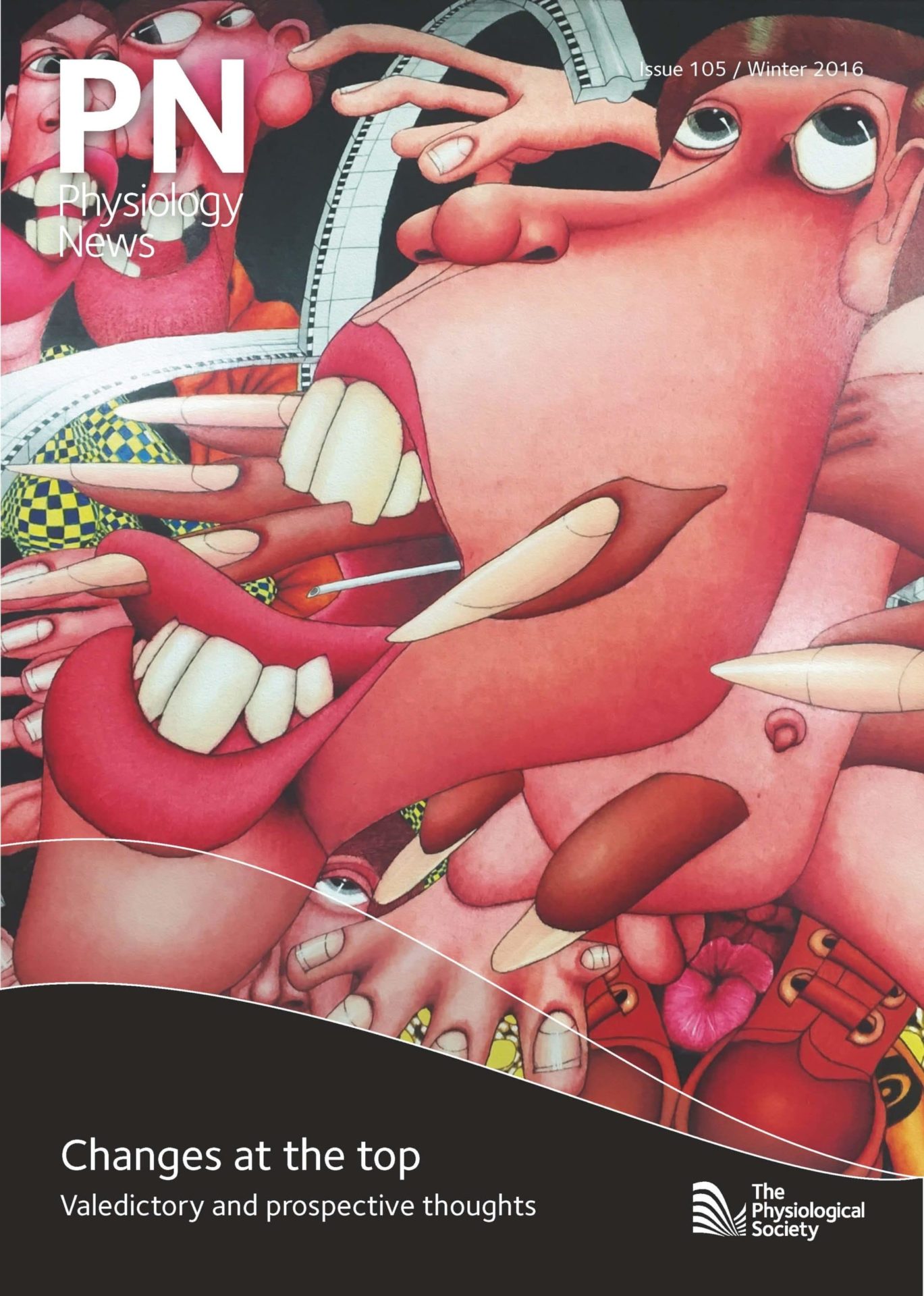
Physiology News Magazine
International Conference of Physiological Sciences (ICPS) in China
25-28 September 2016, Chinese International Congress Centre, Beijing, China
Events
International Conference of Physiological Sciences (ICPS) in China
25-28 September 2016, Chinese International Congress Centre, Beijing, China
Events
Fiona Gribble
Professor of Endocrine Physiology, Institute of Metabolic Science, University of Cambridge, UK
David Eisner
President, The Physiological Society
Jeremy Ward
Faculty of Life Sciences & Medicine, King’s College London, UK
https://doi.org/10.36866/pn.105.18
Having to divide my time between research, teaching, clinical responsibilities and my family, it was with some caution that I agreed to speak at the ICPS jointly organised by the Chinese Association for Physiological Sciences (CAPS) in Beijing, to be held from 25-28 September 2016. Even then, I admit, I was only moved to accept because the invitation was from our new editor of The Journal of Physiology, Kim Barrett, who submitted a proposal to hold a symposium on Enteric Neurobiology and Sensory Signalling, jointly sponsored by The Physiological Society and The Journal of Physiology.
I have been to Beijing twice before. The first was in 1994 when China was still relatively closed. We were accompanied around the clock by an official escort who took us only to approved tourist destinations. We spoke to local people whom our Chinese official had organised in advance, and we saw what we were meant to see. I visited again briefly in 2011, although didn’t then have the opportunity to see much more than my hotel room, an official souvenir shop and the conference venue.
My impressions of Beijing in 2016 are of a city transformed over the past 20 years. We travelled freely around the city – or at least as freely as it is possible to travel without any knowledge of the language. Our hotel was in a less than salubrious side street – not a problem except when trying to find a taxi driver who would admit to knowing its location. On one occasion it took me 5 attempts to find a taxi willing to take me the 10 minute ride back from the conference centre, even though I showed them my hotel card containing a map with the directions in Chinese. One taxi driver even threw me out after a circuit round the block, waving his hands to indicate that he really didn’t know where to go.

What of the meeting itself, though? It was centred around the 90th anniversary of the Chinese Association of Physiological Sciences, and jointly supported by physiological societies from around the world who had partnered together to sponsor individual symposia. Apart from physiologists within China, CAPS made efforts to secure the participation of the many Chinese physiologists who have established laboratories in other parts of the world. The conference location was the Chinese International Congress Centre, just across the road from the Olympic Park. To say that we ‘populated’ the Congress Centre would be to stretch the imagination, as like other Chinese enterprises, the International Congress Centre is vast. With approximately 1000 delegates, however, ICPS did manage to occupy one small section, centred around a poster/exhibit area and with a number of halls variously capable of seating 50 to 500 people. The overall atmosphere was much like many other national and international conferences, and the meeting structure was based around a few selected plenary sessions, followed by series of parallel specialised symposia.
As I sat down, slightly late, to watch my first plenary talk (on lipid droplet fusion and growth), delivered by Peng Li, a Chinese physiologist who trained abroad, I was feeling after the first 5 minutes that I was wasting my time as the lecture was covering some very basic introductory concepts that I’d heard many times before. Almost in an instant, however, the gear then changed and I was treated to some outstanding science, images and mathematical modelling, that I suspect are world-leading in the field. Of course I should have guessed that plenary speakers are selected for a reason!
The symposium at which I was invited to speak consisted of 5 speakers, mixed international and Chinese. The room had a seating capacity of about 60 but was full. All talks at the meeting were conducted in English, and I suspect that the majority of the audience could follow most of the dialogue because we were neither requested to speak particularly slowly, nor was there an attempt at simultaneous translation. I was relieved at the latter, because my 2011 experience of speaking with simultaneous translation taught me that this slows a talk down to a snail’s pace and requires the omission of all interesting minutiae! Our symposium was chaired by Kim Barrett and brought together speakers on enteric neurology (David Grundy, Sheffield, UK), entero-endocrinology (myself, Cambridge, UK), gut microbiota (Tor Savidge, Houston, US), enteric oxytocin (Chuan-Yong Liu, Shandong, China) and afferent dysfunction (Wei-Fang Rong, Shanghai, China). Our audience was mostly made up of young Chinese physiologists who were shy in asking questions (who wouldn’t be in a foreign language?) but had all the appearances of being engaged. Certainly there was less discussion and debate after each talk than you might find at a UK meeting, but I don’t believe that reflected a lack of interest from the audience.
Later in the day, I slipped into the back of a session for young physiologists. True to the spirit of the meeting, they were all speaking in English even though I was probably the only native English speaker in the room. I only once saw a speaker talk in Chinese, and I think she was added late to the programme to replace someone who couldn’t attend. Her switch from English to Chinese was not met with approving looks from some of the more senior Chinese scientists in the audience.
Although I only stayed for one day (I generally prefer to arrive home before my body has even considered adapting to a change in time zone), the meeting was scheduled over 3 days and consisted of 7 plenary lectures, 38 symposia, 4 young physiologists’ symposia and over 300 posters. Like other Physiological Society meetings, the symposia and poster sessions covered topics ranging from cardiovascular and respiratory physiology to cellular physiology and neuroscience. A poster session you might not routinely find at a UK Phys Soc meeting was one on Traditional Medicine, but this was relatively small, comprising only 12 presentations. From the levels of attendance I saw, I’d be surprised if most of the young Chinese physiologists didn’t spend the majority of the meeting attending one session or another.
An outstanding feature of the meeting was the friendliness and generosity of our Chinese hosts. We met together for dinner the evening before our symposium and were treated to a feast that was accompanied by a large number of toasts with rice wine, and culminated in a generous serving of Peking duck. Our souvenir postcards informed us that we had been served something in the region of the restaurant’s 1.96 millionth Peking duck! From there we took a taxi to an area of the city that translates as ‘Back Sea’ – a small lake surrounded by restaurants and bars. Our pavement table, on which was soon arrayed a multitude of beer bottles (the Chinese prefer German beer to their own brew), gave us views both over the lake and to the bar interior where we were treated alternately to a young band playing western-style music, and pole dancing, Chinese style. Witness some bad heads the following morning!
My take-home feelings are of a country much modernised since I last visited, and of the spirit and enthusiasm of the next generation of Chinese physiologists. Not for them will be careers of publishing in low impact journals or testing yet another traditional Chinese herbal extract. Many are gaining practical training abroad, and others who have spent time in the UK and US are returning to generous job offers in China. I suspect we are witnessing the tip of a future iceberg of Chinese excellence in physiology and other sciences – fuelled by increasing local scientific standards, the enormous and highly driven population, and the economic weight of the Chinese powerhouse.
Recognising then that we will likely be overtaken in the next decades by a tsunami of Chinese scientific excellence, I think it should be our pleasure and duty to arm the next generation with the tools of the trade, and with our ideals of collaboration and scientific integrity. Although a joint meeting of ICPS and the Chinese Association for Physiological Sciences is not one to which I would currently send my PhD students and post-docs – the benefit versus financial outlay does not yet stack up in its favour, except for researchers proactively seeking to develop Chinese contacts for career purposes – I strongly support its concepts and ideals. I would certainly encourage colleagues to accept any invitation to speak at a similar future meeting. It is an excellent forum to showcase state-of-the-art science to a growing cohort of young receptive physiologists who probably don’t yet have many opportunities to travel to meetings in the west but are likely to include some of our future international scientific leaders.
Two other members who attended the Chinese meeting have also written about their impressions. We print these comments here to amplify Fiona’s view.
David Eisner
President, The Physiological Society
My impressions of the Beijing meeting were very similar to those expressed by Fiona. I too heard some excellent science It was also a delight to have two days with blue skies when I could see the hills in the distance as opposed to the, all too frequent, smog. Our Chinese colleagues were wonderful hosts although I did have to invent a coping strategy to deal with the large number of toasts at dinner. It was worth getting ridiculed as I sipped the 50% spirits rather than downing in a single gulp. The success of this meeting augurs very well for the 2021 IUPS meeting to be held in the same conference centre. It would also be good if the links between our Society and the Chinese could be developed further by the Chinese attending our Annual Meetings.
Jeremy Ward
Faculty of Life Sciences & Medicine, King’s College London, UK
I was delighted to be invited to the ICPS and speak in the Experimental Physiology symposium ‘Role of ion channels in pulmonary arterial hypertension’. This was my second trip to Beijing, one of the world’s great cities, and it was fantastic to hear some of the really world-class science being performed by our Chinese colleagues. Our symposium was organised by Jian Wang of Guangzhou Medical University and Arizona University, whose delightful students made us welcome and looked after us throughout the whole visit. Even though our session took place on the last morning of the conference and after the (highly enjoyable) banquet the night before, our lecture hall was completely packed (I even saw the CEO of the American Physiological Society in the audience). The presentations were novel and interesting (apart from mine of course), and elicited some excellent discussions.
All in in all it was a highly successful symposium in a highly successful conference. I look forward to the IUPS in Beijing a few years’ time!

